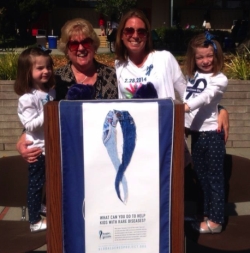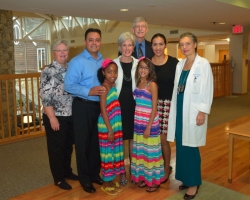How the Autoinflammatory Alliance (formally the NOMID Alliance) was Involved in Rare Disease Day 2014:
Rare Disease Legislative Associates (RDLA) had a number of events, including the RDLA Legislative Conference and Lobby Days in Washington DC. Two of our NOMID Alliance board members and advocates, Carla Herbert and Julie Cunningham, represented patients with autoinflammatory diseases and our organization at the RDLA events for Rare Disease Day 2014. They met and worked with many other rare disease organizations and voiced the needs of our patients to legislators and policy makers in the U.S. government. We prepared a one-page letter to share our message to the elected officials.

Autoinflammatory Alliance board member Julie Cunningham (3rd from left) co-chaired the Global Genes World Rare Disease Day effort.
In addition, Julie Cunningham was the co-chair for the Global Genes World Rare Disease Day effort and she did a great job. In addition to that, and the RDLA events in Washington DC, she also held a rare disease awareness event at Alverno High School in Pasadena, CA. They did a fantastic job telling the students all about the “Wear that You Care” campaign and handing out denim ribbons. Julie and her family also filmed with her daughters a news story on rare diseases for Fox 5 News in San Diego. That story aired on Rare Disease Day and featured their experience with CAPS. Also featured in the news story was Dr. Hoffman, who is on The Autoinflammatory Alliance Medical Advisory Committee.
Carla Herbert was also involved in planning the New Jersey State House Event held on Monday, March 3rd, followed by a luncheon. Peter, Carla’s son spoke about living with a rare disease. Thank you Carla and Peter for your awareness efforts!
Colleen Paduani, board member and advocate, along with a speaker from NORD presented at a special Rare Disease Day Lunch & Learn event hosted by Rabobank in New York City at their headquarters. Rabobank also made a very generous donation to both organizations that day! Thank you for the donation, Rabobank, and to International Desk Manager Andre Hessels and IT’s Michel Angevare for organizing this awareness campaign within RI-NAW. Employees who chose to make a donation, and attend the Lunch n’ Learn received a boxed lunch, bracelet, and pin, and heard two guest speakers with rare diseases in their families explain how their lives have changed with this campaign’s support.
The Autoinflammatory Alliance is a nonprofit organization dedicated to helping those with autoinflammatory diseases.
Donate now to help with awareness, education, and research for these rare diseases.



